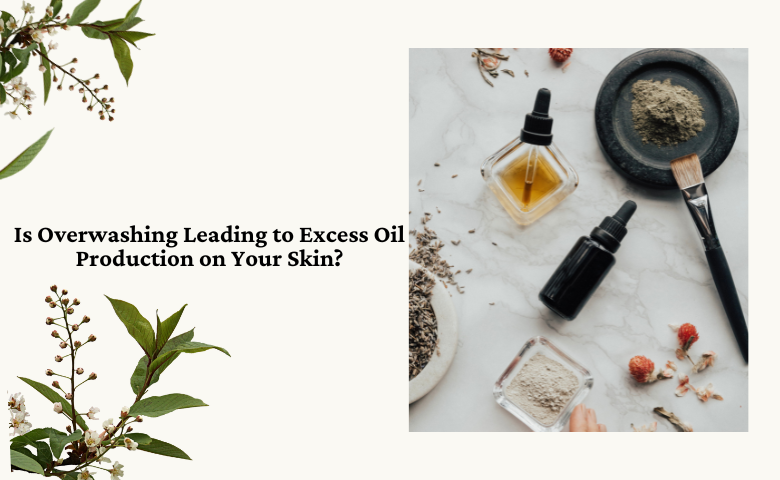
Table of Contents
In as much as the management of oily skin is concerned, there are so many people who think that they can wash their faces as many times as possible to avoid the shine on their skin. It’s a common assumption: the more you cleanse it, the less oily should be your skin. However, this may not exactly work out as planned. Interestingly, it might be thinked that Is overwashing leading to excess oil production on your skin and not the other way round as we may presume. Here is why this happens and how you can ensure you get the right balance in order to have healthy and well controlled skin.
The Science Behind Oil Production
Overwashing can be tremendously fought if the principles of how this oil production is carried out is well understood. In our skin, we have little glands called sebaceous glands, and they secrete sebum, an oily substance that guards skin from drying. This natural oil is indispensable for the skin since it brings protection against external influences and shields the skin from drying.
There are some contributors to sebum secretion, such as hormones, heredity and climatic influences. For example, androgen levels rise during adolescence, menstrual cycle or pregnancy that may lead to stimulated seborrhoea. Likewise, the familiar characteristic of genetic factors can determine the level of oiliness of your skin. Even other external factors such as weather condition, humidity and exposure to pollutants influence the secretion of sebum.
How Overwashing Affects Your Skin?
- Disruption of the Skin Barrier:
The skin barrier refers to the over layer of lipids and proteins on the outer surface of the skin that serves to prevent substances that have negative effects on the skin and loss of moisture. This barrier can also be lessened with the overwashing of hair, and if one uses strong soaps or washes it vigorously, then this barrier can be weakened. This disruption interferes with the skin’s localization of moisture which causes dryness and irritation.
When the skin loses its moisture, sebaceous glands may respond by secretory production in an attempt to replace the moisture. This excess oil, results in greasiness and many problems such as formation of acne and blockage of the pores. In other words over-washing of the skin can cause chain reaction through which the skin itself over produces sebum as a signal that the skin is being washed or scrubbed too often.
- Increased Oil Production:
If the skin is washed using the soap and water frequently, then this will cause the skin to produce more oil in order to compensate for its loss. The sebaceous glands may get the message that skin is overly dry and try to compensate by increasing sebum output. This excess oil can cause more harm than good by making the skin even oilier hence giving you that overly oily feeling all day.
Further, washing exposes the skin to harsh conditions hence may lead to inflammation and skin irritation. This inflammation may actually increase the activity of the sebaceous glands which leads to more production of the oil. This is a problem that can be witnessed in most people who often use care or aggressive cleaning materials.
- Irritation and Sensitivity:
The skin’s texture and elasticity can also be compromised because washing it often with harsh, frequent, strong soaps or exfoliants can cause irritation of the skin. The symptoms of irritation are redness of skin, itching, and the location may burn when in touch with it. Skin that is irritated becomes inflamed and the inflammation prompts more secretion of sebum and hence increases the cycle of irritation and oily skin.
Similarly, burn also affects the skin’s capacity to heal by causing super sensitivity leading to aggravated skin with poor ability in healing after damage. This can result for a number of days hence causing problems of oily skin and acne.
Tips for Managing Oily Skin Without Overwashing
To manage oily skin effectively, it’s crucial to strike a balance between cleansing and maintaining the skin’s natural moisture. Here are some practical tips to help you achieve that balance:
- Choose a Gentle Cleanser:
Choose a light, sulfate free facial wash as this does not remove skin oil hence damaging the skin. Acidic products or products that contain alcohol solution and strong Prescription products affect breaking skin barrier, effects sebum production. Choose products with the terms ‘non-comedogenic’ or ‘for sensitive skin’ on their labels to reduce the chances of pore blockage and skin breakout.
For instance, cleansers containing such chemicals as salicylic acid or glycolic acid are good for people with oily skin since they should help to tighten pores, or rather eliminate the dirt accumulated in them. However do not over wash or use other related products which usually cause the skin to become too dry and irritated.
- Wash Twice Daily:
A balanced approach to cleansing involves washing your face twice a day – once in the morning and once before bed. This routine helps remove dirt, sweat, and excess oil without overwhelming the skin. If you engage in activities that cause excessive sweating or are exposed to pollutants, an additional gentle cleanse may be necessary.
Avoid the temptation to wash your face more frequently, as this can lead to dryness and increased oil production. Stick to a consistent routine that addresses your skin’s needs without overdoing it.
- Avoid Overuse of Exfoliants:
Exfoliation is essential for removing dead skin cells and preventing clogged pores. However, overusing exfoliants can irritate the skin and disrupt the skin barrier. Limit exfoliation to 2-3 times a week and choose products with gentle exfoliating agents such as alpha hydroxy acids (AHAs) or beta hydroxy acids (BHAs).
Consider incorporating exfoliating products that offer both physical and chemical exfoliation. Physical exfoliants, like scrubs, should be used with caution to avoid damaging the skin. Chemical exfoliants, like those containing salicylic acid or lactic acid, can provide a more even exfoliation without the risk of physical abrasion.
- Incorporate Hydrating Products:
Even if your skin is oily, it’s crucial to use hydrating products to maintain a healthy moisture balance. Opt for lightweight, oil-free moisturizers that provide hydration without clogging pores. Gel-based moisturizers or those with hyaluronic acid can be excellent choices for oily skin, as they offer hydration without adding excess oil.
Additionally, incorporating hydrating serums or essences into your routine can help maintain moisture levels and improve skin texture. Look for products that contain ingredients like glycerin or squalane, which provide hydration without being overly greasy.
- Use Oil-Absorbing Products:
To manage excess oil throughout the day, consider using oil-absorbing products such as blotting papers or mattifying primers. Blotting papers can quickly absorb excess oil and reduce shine without disrupting your makeup or skincare routine. Mattifying primers can help control oil production and create a smooth base for makeup application.
Be cautious not to rely solely on these products, as they are meant to complement a balanced skincare routine rather than replace it. Incorporating oil-absorbing products should be part of a broader strategy for managing oily skin.
- Listen to Your Skin:
Every person’s skin is unique, and its needs can change over time. Pay attention to how your skin responds to your cleansing routine and adjust accordingly. If you notice signs of dryness, irritation, or increased oiliness, consider modifying your routine to better suit your skin’s needs.
Keep track of any changes in your skin’s condition and adapt your best skincare routine as necessary. If you’re unsure about the best approach for your skin type, consult a dermatologist for personalized advice and recommendations.
Here you can read about Essential Do’s and Don’ts for Managing Oily Skin
Addressing Common Misconceptions
Several misconceptions about oil and its role in skincare can contribute to confusion and ineffective practices. Let’s address a few of them:
- “Oily Skin Doesn’t Need Moisturizer”
A typical misconception that people have is that it is pointless for oily skinned individuals to apply moisturizer. In fact, all those skin types require moisturizers as part of regular skin care to keep the skin in good condition.
Failing to use moisturizer makes skin become imbalanced for moisture and in their bid to correct this, they produce more oil. Although you do not want your skin to be greasy opt for a light, oil-free moisturizer to give your skin the moisture it needs.
- “Washing More Frequently Will Clear Up Acne”
Washing your face more often doesn’t necessarily lead to clearer skin. Overwashing can irritate the skin and potentially worsen acne by increasing inflammation and oil production. Instead, focus on a consistent, gentle cleansing routine and use targeted treatments for acne if needed.
Consider incorporating ingredients like benzoyl peroxide or tea tree oil into your routine if you struggle with acne. These ingredients can help reduce inflammation and control acne without over-drying the skin.
- “All Cleansers Are Created Equal”
Not all cleansers are suitable for oily skin. Harsh cleansers or those containing high levels of alcohol can exacerbate oiliness and disrupt the skin barrier. Choose a cleanser that fits your skin type and addresses your specific concerns. Look for products designed for oily or combination skin and avoid those that may cause additional irritation.
Conclusion
Overwashing can lead to excess oil production, disrupting the delicate balance of your skin. The key to effective skincare is finding a cleansing routine that maintains cleanliness without stripping the skin of its natural oils. By choosing gentle products, sticking to a balanced routine, and paying attention to your skin’s needs, you can manage oily skin and achieve a healthier complexion.
Skincare is a highly individualized process, and what works for one person may not work for another. Don’t be afraid to experiment and find what suits your skin best. If you’re struggling with persistent issues or need personalized advice, consider consulting a dermatologist. With the right approach, you can achieve a balanced, healthy complexion and enjoy the benefits of effective skincare.
